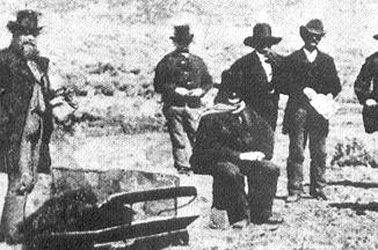The Salt Lake Tribune published an article earlier this month: “New Mormon mission: How to teach members the messy part of LDS history, theology.” Written by Peggy Fletcher Stack, the article looks at the need for the Mormon Church to shift its “simple” historical narrative to something that comports more with truth. She writes,
“These [simple] tales of Joseph Smith’s founding of the LDS Church have been repeated across the globe by generations of Latter-day Saints, as well as Mormon missionaries, eager to convert others to what they believe.
“Trouble is, the real history is much more nuanced, complicated, even contradictory…
“Now, prompted by the rise of social media, the availability of LDS documents, groundbreaking scholarship, widespread Internet sharing of little-known aspects of the faith’s past and a disturbing exodus of the formerly faithful, Mormonism is in the midst of a landmark effort to integrate new details about its founding — without losing the power of a simple narrative.
“Can it add layers of what some see as controversial information without scaring away new converts or longtime members whose devotion is built on the account as they’ve known it all their lives?”
I hope not. I would like to see Mormons and those investigating Mormonism recognize that the true history of Mormonism demonstrates that it is impossible for it to be what it claims to be; and therefore, it is unable to lead followers to eternal life.
However, a comment included in the Salt Lake Tribune article goes some distance to rob me of that hope:
“‘No religion I know of would want to turn its founding stories into history, at least as history is understood today in a scientific sense,’ says Kathleen Flake, who heads up Mormon studies at the University of Virginia. ‘Faith is not about fact; nor about fiction, for that matter. It’s certainly not a question of sophistication, at all, but of religious sense.’”
Dr. Flake wants to divorce faith from fact, and I think doubting Mormons will find comfort in following her lead. But faith divorced from fact is not really faith at all.
Christian apologetics ministry Stand to Reason addresses this issue in an article by Greg Koukl titled, “Faith and Facts.” In it, Mr. Koukl explains,
“I don’t like the word ‘faith.’ Not because faith isn’t valuable, but because it’s often deeply misunderstood. ‘Faith’ in this twisted sense is what you use when all reason is against you. It’s religious wishful thinking, in which one squeezes out spiritual hope by intense acts of sheer will. People of ‘faith’ believe the impossible. People of ‘faith’ believe that which is contrary to fact. People of ‘faith’ believe that which is contrary to evidence. People of ‘faith’ ignore reality…
“Some suggest we cannot find facts to support our faith, nor is it preferable to try. Faith is not the kind of thing that has anything to do with facts, they say. If we have evidence to prove what we believe, then that takes away from real faith.
“Somehow these people think that genuine faith is eviscerated by knowledge and evidence. We’ve made a virtue out of believing against the evidence, as if that’s what God has in mind for us. This is all wrong.”
 I’ve heard this same reasoning from many Mormons over they years. They tell me there is no archaeological evidence for the Book of Mormon, for example, because then there would be no need for faith, and God wants us to have faith. As Mr. Koukl says, this is all wrong. What these Mormons are holding up as a virtuous faith does not resemble biblical faith. Mr. Koukl illustrates how the Bible defines faith:
I’ve heard this same reasoning from many Mormons over they years. They tell me there is no archaeological evidence for the Book of Mormon, for example, because then there would be no need for faith, and God wants us to have faith. As Mr. Koukl says, this is all wrong. What these Mormons are holding up as a virtuous faith does not resemble biblical faith. Mr. Koukl illustrates how the Bible defines faith:
“If we want to exercise biblical faith–Christian faith–then we ought first to find out how the Bible defines faith. The clearest definition comes from Hebrews 11:1. This verse says, ‘Faith is the assurance of things hoped for, the conviction of things not seen.’ Now, there’s something very important in these words. We see the word ‘hope,’ we see the word ‘assurance,’ and we see the word ‘conviction’–that is, confidence. Now, what gives us confidence?
“If you buy a lottery ticket, do you hope you’ll win the lottery? Yes, of course you do. Do you have any assurance you’ll win the lottery? Absolutely not. You have no way of knowing that your ticket is any better than the millions of other lottery tickets out there competing for the same pot.
“But what if you had x-ray vision, and you could see through the gray scratch-off coating on the lottery tickets you buy at the supermarket? You’d know if you had a $100, $200 or a $1,000 winner, wouldn’t you? In that case, would you merely hope you’d win? No, you’d have assurance, wouldn’t you? You’d have assurance of those things you previously only hoped for. It would be hope with conviction, not a mere hoped, but a hope buttressed by facts and evidence.
“That’s why the Christian faith cares about the evidence, friends. For the biblical Christian, the facts matter. You can’t have assurance for something you don’t know you’re going to get. You can only hope for it.
“This is why the resurrection of Jesus is so important. It gives assurance to the hope. Because of a Christian view of faith, Paul is able to say in 1 Corinthians 15 that when it comes to the resurrection, if we have only hope, but no assurance–if Jesus didn’t indeed rise from the dead in time/space history–then we are of most men to be pitied. That’s what he says: We are of most men to be pitied.
“This confidence Paul is talking about is not a confidence in a mere ‘faith’ resurrection, a mythical resurrection, a story-telling resurrection. Instead, it’s a belief in a real resurrection. If the real resurrection didn’t happen, then we’re in trouble.
“The Bible knows nothing of a bold leap-in-the-dark faith, a hope-against-hope faith, a faith with no evidence. Rather, if the evidence doesn’t correspond to the hope, then the faith is in vain, as even Paul has said.”
So I disagree with Dr. Flake. Biblical faith is about fact. Saving faith is based on fact. And so the facts surrounding Mormonism and the Mormon Church do matter to the question of whether this religion can lead its adherents to eternal life in the presence of God.
Mr. Koukl tells his readers that faith does not stop at the point of belief.
“So, faith is knowing, and that knowledge is based on evidence leading to confidence or conviction. But biblical faith is more than that. There’s another element. Faith is not just knowing. Faith is also acting. Biblical faith is a confidence so strong that it results in action. You’re willing to act based on that belief, that faith…
“Friends, Christianity is not denying reality. Some people think it is. I’m sympathetic to them because some Christians act as if faith is a kind of sanctified denial. But that isn’t what biblical Christianity is about. Biblical Christians don’t deny reality, they discover reality. And once they’ve discovered it, they act on what they’ve learned.”
My continuing hope is that Mormons will indeed discover reality and act on what they’ve learned. My hope is that they will abandon the empty promises of Mormonism for the sure and certain promises of Christ. And here’s why. Applying Mr. Koukl’s closing argument to Mormonism by substituting the word “Mormonism” where he had “Christianity,”
“if [Mormonism] is true, in the deepest sense of the word, then it must fit the facts of the real world. So, when we discover the facts of the real world, they can only support [Mormonism]– if [Mormonism] is true.”
Conversely, if the facts of the real world do not fit Mormonism, Mormonism is shown to be untrue. And for those who cling to this hope against hope by continuing to place their faith in a false religious system — for those who will not act on what they’ve learned — devastatingly, their faith is in vain.




 Dr. Riess seems to suggest that a mutual invocation of the name “Jesus Christ” trumps any “real theological differences between Mormons and evangelicals,” failing to recognize the real and deep theological differences inherent even in her simple assertion of a “mutual belief in the Savior, Jesus Christ.”
Dr. Riess seems to suggest that a mutual invocation of the name “Jesus Christ” trumps any “real theological differences between Mormons and evangelicals,” failing to recognize the real and deep theological differences inherent even in her simple assertion of a “mutual belief in the Savior, Jesus Christ.”